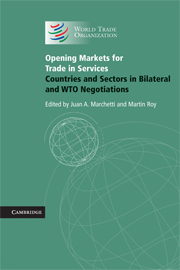Book contents
- Frontmatter
- Contents
- List of figures
- List of tables
- List of boxes
- List of contributors
- Foreword
- Acknowledgments
- Disclaimer
- Summary and overview
- PART I From Policy to Negotiations
- PART II Multilateral and Bilateral Negotiations on Services: Overall Perspectives
- PART III Challenges, Issues and Opportunities in Services Sectors
- PART IV Country Experiences with Services Trade
- 14 GATS plus or minus? Services commitments in comparative contexts for Colombia and Uruguay
- 15 Opening services markets at the regional level under the CAFTA-DR: the cases of Costa Rica and the Dominican Republic
- 16 Why isn't South Africa more proactive in international services negotiations?
- 17 Services liberalization in PTAs and the WTO: the experiences of India and Singapore
- 18 The domestic dynamics of preferential services liberalization: the experience of Australia and Thailand
- 19 The Chilean experience in services negotiations
- Appendix: A reader's guide to basic GATS concepts and negotiations
- Index
- References
17 - Services liberalization in PTAs and the WTO: the experiences of India and Singapore
Published online by Cambridge University Press: 05 December 2011
- Frontmatter
- Contents
- List of figures
- List of tables
- List of boxes
- List of contributors
- Foreword
- Acknowledgments
- Disclaimer
- Summary and overview
- PART I From Policy to Negotiations
- PART II Multilateral and Bilateral Negotiations on Services: Overall Perspectives
- PART III Challenges, Issues and Opportunities in Services Sectors
- PART IV Country Experiences with Services Trade
- 14 GATS plus or minus? Services commitments in comparative contexts for Colombia and Uruguay
- 15 Opening services markets at the regional level under the CAFTA-DR: the cases of Costa Rica and the Dominican Republic
- 16 Why isn't South Africa more proactive in international services negotiations?
- 17 Services liberalization in PTAs and the WTO: the experiences of India and Singapore
- 18 The domestic dynamics of preferential services liberalization: the experience of Australia and Thailand
- 19 The Chilean experience in services negotiations
- Appendix: A reader's guide to basic GATS concepts and negotiations
- Index
- References
Summary
The services sector plays a crucial role in the economic growth and development of both India and Singapore. The two countries have liberalized unilaterally and developed global competitiveness in selected services, and now they are major exporters. Consequently, they not only have an aggressive interest in the multilateral liberalization of trade in services, but also perceive this sector as an integral part of their preferential trade agreements.
India and Singapore differ in terms of country size, political system, and governance structure. This results in different ways of approaching PTA negotiations. This chapter presents the experiences of these two countries in negotiating and implementing bilateral agreements encompassing services. It also highlights how liberalization commitments differ between various bilateral agreements, as well as in comparison to the WTO, and explores the factors leading to such outcomes.
The outline of the chapter is as follows. I first provide an overview of the service sectors of India and Singapore, and then discuss the market access commitments undertaken by the two countries in the WTO. The third section presents the PTAs negotiated by the two countries and discusses the reasons for pursuing bilateral agreements simultaneously with multilateral negotiations. The fourth section compares the outcome of bilateral agreements with those under the GATS and highlights the sectors in which India and Singapore are willing to guarantee access to selected trading partners rather than on an MFN basis.
- Type
- Chapter
- Information
- Opening Markets for Trade in ServicesCountries and Sectors in Bilateral and WTO Negotiations, pp. 600 - 632Publisher: Cambridge University PressPrint publication year: 2009



